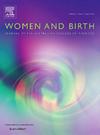A systematic review of key principles relating to decolonising interventions in midwifery education
IF 4.4
2区 医学
Q1 NURSING
引用次数: 0
Abstract
Problem
Midwifery education is predominantly influenced by Eurocentric models, contributing to systemic health inequalities for marginalised groups.
Background
The health disparities for ethnically diverse maternity service users are well documented. There are various decolonising interventions such as cultural safety education, being implemented to address these disparities by challenging colonial legacies and power imbalances that perpetuate health inequity.
Research Question: What are the key principles of decolonising interventions in midwifery education, that can be applied to midwifery education on a global scale?
Methods
This study follows a systematic literature review based on the PRISMA guidelines. Data were sourced from six databases, evaluating peer-reviewed articles between February 2014 and February 2024. The PICO framework guided the research. A thematic synthesis approach was used for data analysis.
Findings
Four major themes emerged: (1) centring Indigenous knowledge, (2) cultural safety, (3) transformative learning, and (4) systemic institutional support. Workshops, yarning circles, and experiential placements were identified as effective mechanisms for promoting cultural safety and addressing discomfort. However, educators often lacked the skills and confidence to implement these changes.
Discussion
Decolonising midwifery education requires ongoing reflexivity, institutional support, and curricula co-design with Indigenous communities. Barriers such as discomfort from participants and inadequate institutional structures must be addressed to ensure long-term impact.
Conclusion
Decolonising interventions in midwifery education fosters culturally safe care. However, further research is needed to assess the long-term outcomes on health equity and the impact of such interventions on marginalised communities.
求助全文
约1分钟内获得全文
求助全文
来源期刊

Women and Birth
NURSING-OBSTETRICS & GYNECOLOGY
CiteScore
7.20
自引率
13.20%
发文量
371
审稿时长
27 days
期刊介绍:
Women and Birth is the official journal of the Australian College of Midwives (ACM). It is a midwifery journal that publishes on all matters that affect women and birth, from pre-conceptual counselling, through pregnancy, birth, and the first six weeks postnatal. All papers accepted will draw from and contribute to the relevant contemporary research, policy and/or theoretical literature. We seek research papers, quality assurances papers (with ethical approval) discussion papers, clinical practice papers, case studies and original literature reviews.
Our women-centred focus is inclusive of the family, fetus and newborn, both well and sick, and covers both healthy and complex pregnancies and births. The journal seeks papers that take a woman-centred focus on maternity services, epidemiology, primary health care, reproductive psycho/physiology, midwifery practice, theory, research, education, management and leadership. We also seek relevant papers on maternal mental health and neonatal well-being, natural and complementary therapies, local, national and international policy, management, politics, economics and societal and cultural issues as they affect childbearing women and their families. Topics may include, where appropriate, neonatal care, child and family health, women’s health, related to pregnancy, birth and the postpartum, including lactation. Interprofessional papers relevant to midwifery are welcome. Articles are double blind peer-reviewed, primarily by experts in the field of the submitted work.
 求助内容:
求助内容: 应助结果提醒方式:
应助结果提醒方式:


